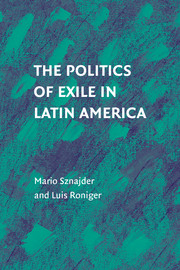Book contents
- Frontmatter
- Contents
- Acknowledgments
- List of Acronyms
- Introduction: The Politics of Exile
- 1 Defining the Exilic Condition
- 2 Forceful Displacement, the Construction of Collective Identities, and State Formation
- 3 The Format of Early Exile
- 4 Sites of Exile
- 5 Widening Exclusion and the Four-Tiered Structure of Exile
- 6 Exile Communities, Activism, and Politics
- 7 Presidents in Exile
- 8 Is Return the End of Exile?
- Bibliography
- Index
- References
Introduction: The Politics of Exile
Published online by Cambridge University Press: 28 July 2009
- Frontmatter
- Contents
- Acknowledgments
- List of Acronyms
- Introduction: The Politics of Exile
- 1 Defining the Exilic Condition
- 2 Forceful Displacement, the Construction of Collective Identities, and State Formation
- 3 The Format of Early Exile
- 4 Sites of Exile
- 5 Widening Exclusion and the Four-Tiered Structure of Exile
- 6 Exile Communities, Activism, and Politics
- 7 Presidents in Exile
- 8 Is Return the End of Exile?
- Bibliography
- Index
- References
Summary
In this book, we analyze the resilience and transformation of political exile from colonial times to the present in Latin America. The premise of this study is that exile has been a regulatory mechanism for political systems unable to create pluralistic and inclusive models of participation; and although exile developed as an elite phenomenon in the 19th century when political participation was restricted, it became a massive trend in the 20th century as mobilizations and more inclusive participation led to authoritarian rule.
Exile is a perennial subject that signals the logic of political exclusion and displacement from internal public spheres. Western democracies have increasingly developed pluralistic and tolerant public spheres that enabled them to contain countervailing, opposition forces without expelling them from their midst, as long as all sides abided by the democratic game. Former ruling elites, whose misdeeds during tenure have been exposed publicly, as well as dissident intellectuals and vocal opponents of incumbent administrations, have been able to act and express themselves in the public domains without being forced to abandon their home countries. After impeachment procedures were recommended, Richard Nixon resigned the presidency in 1974 but did not leave the United States. Charles De Gaulle abandoned office in 1946 for the solace of Colombey les Deux-Eglises, to return to power in 1958 and establish the Fifth Republic. When Giulio Andreotti, prime minister of Italy for many terms, was accused of corruption and complicity with organized crime, he still could stay in his home country and trust justice.
- Type
- Chapter
- Information
- The Politics of Exile in Latin America , pp. 1 - 10Publisher: Cambridge University PressPrint publication year: 2009



